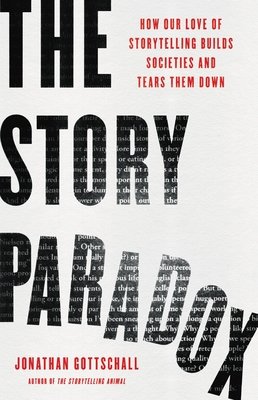
10 Jul Book Review of The Story Paradox: How Our Love of Storytelling Builds …
The Story Paradox: How Our Love of Storytelling Builds Our World – A Reflection on Jonathan Gottschall’s Provocative Insights
As I settled down with The Story Paradox: How Our Love of Storytelling Builds Our World, Jonathan Gottschall’s latest exploration of the storytelling phenomenon, I felt a familiar thrill akin to revisiting an old friend. Having previously been mesmerized by his earlier work, The Storytelling Animal, I was eager to unravel how he would tackle a more ominous topic: the potential pitfalls of our relentless storytelling drive. Spoiler alert: this book is both illuminating and deeply unsettling.
Gottschall embarks on a journey that examines the very essence of storytelling — its power, its risks, and how it shapes our interactions. The central premise? Storytelling isn’t merely a tool for communicating; it’s a powerful means of persuasion that can manipulate thoughts and emotions. I found myself nodding furiously at his assertion that much of our daily dialogue serves less to convey information than to sway hearts and minds. This is a perspective I hadn’t fully considered before, and it added an intriguing depth to my understanding of communication.
Though Gottschall acknowledges the burgeoning field of “story science” is still developing, he wields a potent argument: our language is riddled with narrative, influenced by a primal instinct to craft compelling tales. Yet here lies the paradox: while stories can unite and uplift, they can also mislead and divide, especially in an era where quick, sensational narratives often overshadow more thoughtful discourse.
One particularly striking moment in the book is Gottschall’s commentary on social media, especially Facebook. He writes, “Facebook hasn’t thrived because it discovered a new way of capturing attention… its algorithm just independently discovered the oldest way of capturing attention – the universal grammar of storytelling.” This realization sent chills down my spine. The implications are staggering; we are not merely consuming stories, but are often at the mercy of narratives that cater to our darker impulses. This dualistic nature of storytelling resonated with me, highlighting the importance of vigilance in our consumption of narrative.
Gottschall’s writing style is conversational and accessible, blending personal anecdotes with scholarly insights. Yet, I did sense a yearning for more concrete conclusions or scientific findings that he leaves somewhat unexplored. The acknowledgment of the need for further research left me wanting more, yet it simultaneously ignited my curiosity about the untapped depths of this fascinating field.
As I reached the final pages, I found myself searching for answers that remained tantalizingly out of reach. While perhaps not as exhaustive as I had hoped, The Story Paradox is a thought-provoking read that eloquently argues for the necessity of deeper understanding in an age where storytelling shapes our reality – even our perspectives on who we are.
This book will resonate with anyone who’s ever popped open a book just to sink into a world of narrative, as well as those who have pondered the impact of media on society. It’s a reflective journey that may leave some uncomfortable, but ultimately, it’s one that’s well worth taking. So grab a copy, settle in, and prepare to think deeply about the stories we tell—and those told to us. You’ll emerge not just as a reader, but as an engaged participant in the ever-unfolding narrative that is our shared human experience.
Discover more about The Story Paradox: How Our Love of Storytelling Builds … on GoodReads >>









